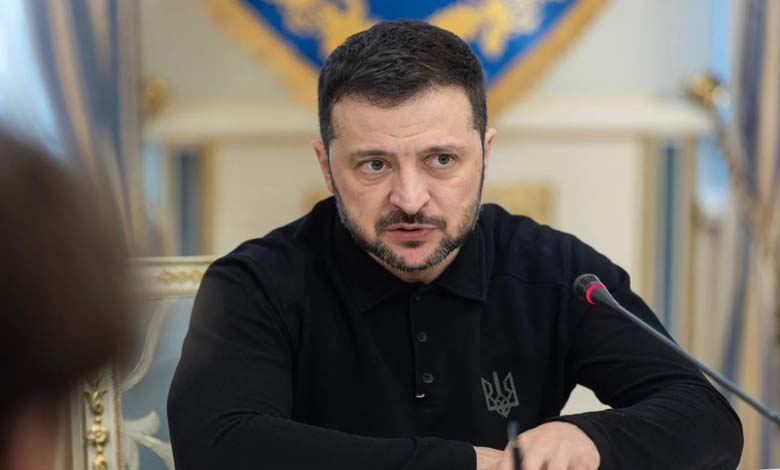A Personal Memory Prevents Zelensky from Swallowing the Poison Pill of Donbass

The Donbass region, where the war in Ukraine began a decade ago, has witnessed the deaths of countless Ukrainian soldiers and now stands at the center of peace negotiations.
Last Monday, a map of Ukraine displayed on an easel in the Oval Office sent a clear signal: a large swath of territory in the east, known as Donbass, had fallen under Russian control. For former U.S. President Donald Trump, those lands shaded in red were lost; Ukraine had to strike a deal to achieve peace, otherwise it risked losing even more, according to The New York Times.
-
Preparations for a Putin–Zelensky Meeting… and a Gathering of Allied Military Chiefs
-
After a 40-Minute Call… Trump Announces Preparations for a Meeting Between Putin and Zelensky
For Ukrainian President Volodymyr Zelensky, however, the map presented during his meeting with Trump and European leaders conveyed a far more complex picture. It was not a business deal nor a poker game — it was personal. Zelensky told Trump that his grandfather had fought in World War II to liberate Donbass cities from the Nazis. He could not simply abandon that territory.
On Wednesday, just hours after returning to Kyiv, Zelensky reiterated this point to journalists: “Many families fought to liberate Donbass. Many fell, many were wounded. This is a particularly painful moment in our history and in Ukrainian life.” He added firmly: “It is not as simple as some might think.”
-
The Absent Yet Present in Alaska: Zelensky Heads to Washington as Europe Joins the Call
-
The Absent Yet Present in Alaska: Zelensky Heads to Washington, Europe Joins the Call
At the Heart of Negotiations
According to The New York Times, it remains unclear where Trump’s latest diplomatic push to end Europe’s bloodiest war since World War II will ultimately lead. Donbass, a mineral-rich region comprised mainly of Donetsk and Luhansk, will be central to any settlement.
Roughly the size of West Virginia, Donbass has been the main battlefield of the war. Tens of thousands of soldiers from both sides have died there for minimal territorial gains. Russia is now seeking to capture the remaining 2,500 square miles still under Ukrainian control.
Russian President Vladimir Putin has demanded that Ukraine relinquish the entire Donbass, including areas still governed by Kyiv, home to more than 200,000 Ukrainians in cities such as Kramatorsk and Sloviansk — the very places Zelensky’s grandfather fought to defend.
-
Explosive July in Ukraine: Zelensky Reveals the Black Harvest
-
Avoiding the Zelensky trap: Brazil requests guarantees before a Lula-Trump call
A Political Trap
Analysts argue that Putin’s ambitions go beyond territorial conquest: he seeks to weaken Zelensky politically. Opinion polls show that most Ukrainians firmly oppose ceding any land to Russia, and Ukraine’s constitution explicitly forbids such concessions.
This leaves Zelensky facing an impossible choice: back an unpopular compromise or risk angering Trump. “It’s a poison pill,” said Vadym Prystaiko, former Ukrainian foreign minister. “Ukraine will have to swallow it, and only then will we see if it can digest it.”
Former officials and political analysts suggest that the only way to make territorial concessions acceptable to Ukrainians would be with ironclad security guarantees — for example, a Western-backed arrangement combining European troops and U.S. air cover to deter future Russian aggression.
-
Zelensky Calls for Tougher Sanctions on Russia… Because of Iran
-
Zelensky and the Missing Suit… A Battle between War and Diplomacy
Between Concession and Exchange
Balazs Jarabik, a former EU political adviser in Kyiv, argued that Ukraine may have reached a point where it could accept giving up some land “in exchange for a peace deal that provides Western security guarantees.” He added: “If that means letting go of Donbass, I think Ukraine would do it.”
Trump has described such concessions as mere “land swaps,” suggesting that Russia might return small portions of territory in northeastern Ukraine in return. His administration believes such an exchange would actually benefit Kyiv, since Donbass is likely to fall soon and Ukraine would otherwise lose its last bargaining chips.
But Ukrainians see it differently. Maksym Skrypchenko, head of the Transatlantic Dialogue Center, noted that Russia’s advances have been slow over the past three years. Abandoning Donbass now would mean handing over fortified cities that could serve as staging grounds for future invasions.
-
When Clothing Becomes a Weapon… Why Does Zelensky Refuse to Wear a Suit?
-
Why Zelensky’s Resignation Seems Impossible Right Now
A Reversal of Perspective
Once regarded as a peripheral, pro-Russian stronghold, Donbass — home to 6.7 million people, most of them Russian-speaking — overwhelmingly backed pro-Russian President Viktor Yanukovych in 2010.
Now, with Kyiv’s security guarantee dilemma unresolved, Harry Nedelcu, an analyst with Rasmussen Global, observes: “We are basically back to square one. Unless something is imposed on Putin, nothing will move forward in the peace talks.”
He concluded: “Instead, I see more fighting ahead.”
-
Washington and Kyiv: Zelensky Bets on “Behind-the-Scenes” Agreements
-
Ukraine Faces an Uncertain Future after a Clash Between Zelensky and Trump
-
Trump, Zelensky, and the Metals Deal: Stakes Far Greater Than the Agreement Itself












